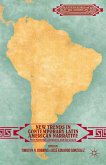Dieser Download kann aus rechtlichen Gründen nur mit Rechnungsadresse in A, B, BG, CY, CZ, D, DK, EW, E, FIN, F, GR, HR, H, IRL, I, LT, L, LR, M, NL, PL, P, R, S, SLO, SK ausgeliefert werden.
"Thoroughly researched, rigorously argued, beautifully written, Private Topographies is one of the most provocative and stimulating books on modern Latin America. Using an impressive array of material from literature, architecture, psychoanalysis and social theory, Marzena
Grzegorczyk explores the profound implications that political transformations have both on peoples' daily lives, and on their cultural production. A brilliant piece of cultural criticism, recommended to anyone interested in Latin America, politics, philosophy or human condition in general." - Ignacio Ramonet, Directeur du "Monde diplomatique"
"Private Topographies provides a powerful model for interdisciplinary thinking. Drawing upon such diverse areas as urban planning, political history, phenomenology, and post-colonial theory, Grzegorczyk examines the concept of space as it emerges within a series of major texts that cut across nineteenth-century Latin America. Interweaving themes such as citizenship, national identity, and subjectivity, she at once illuminates these texts and the culture out of which they arose." - Herbert Lindenberger, Stanford University, Avalon Foundation Professor of Humanities, Emeritus
"Private Topographies is an ambitious project that analyzes different types of subjectivities taking shape in politically and culturally transitional 19th-Century Latin America. In this post-indepencence period of flux, the interiors of homes, urban layouts, journeys, and regional topographies are being re-signified in terms of shifting notions of tradition and modernity, and the roles of subjects marked by different classes, races, and genders. By focusing on these re-
fs20definitions of spaces, Marzena Grzegorczyk is able to capture different aspects of the new Creole subjectivities in a complex contextual manner. ...a welcome contribution to the critical and theoretical renovation 19th-Century Latin American studies are currently undergoing." - Fernando Unzueta, Ohio State University
"Private Topographies examines the gridlocks of postcolonial subjectivity in the Latin American post-Independence period. In times of social and political turmoil the collective forms of spatio-temporal intuition change. As space displaces time, or as time displaces space, individuals must re-take time and space in the new nation. What the author calls acts of implacement are performative claims for belonging, for presence, or for appropriation. This book moves through the history of Mexico, Argentina, and Brazil in order to investigate the construction of the subject at the time of nation-building. It is an alternative and fascinating account concerning the problems of symbolic identification for emerging national communities." - Alberto Moreiras, Duke University









